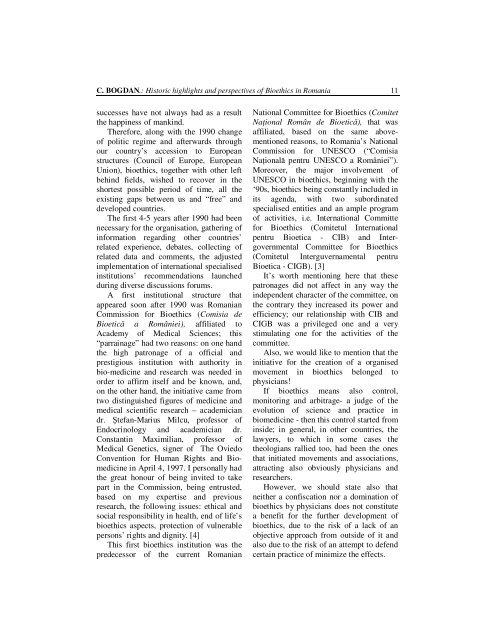Series VI: Medical Sciences – SUPPLEMENT ... - Krongres
Series VI: Medical Sciences – SUPPLEMENT ... - Krongres
Series VI: Medical Sciences – SUPPLEMENT ... - Krongres
You also want an ePaper? Increase the reach of your titles
YUMPU automatically turns print PDFs into web optimized ePapers that Google loves.
C. BOGDAN.: Historic highlights and perspectives of Bioethics in Romania 11<br />
successes have not always had as a result<br />
the happiness of mankind.<br />
Therefore, along with the 1990 change<br />
of politic regime and afterwards through<br />
our country’s accession to European<br />
structures (Council of Europe, European<br />
Union), bioethics, together with other left<br />
behind fields, wished to recover in the<br />
shortest possible period of time, all the<br />
existing gaps between us and “free” and<br />
developed countries.<br />
The first 4-5 years after 1990 had been<br />
necessary for the organisation, gathering of<br />
information regarding other countries’<br />
related experience, debates, collecting of<br />
related data and comments, the adjusted<br />
implementation of international specialised<br />
institutions’ recommendations launched<br />
during diverse discussions forums.<br />
A first institutional structure that<br />
appeared soon after 1990 was Romanian<br />
Commission for Bioethics (Comisia de<br />
Bioetic� a României), affiliated to<br />
Academy of <strong>Medical</strong> <strong>Sciences</strong>; this<br />
“parrainage” had two reasons: on one hand<br />
the high patronage of a official and<br />
prestigious institution with authority in<br />
bio-medicine and research was needed in<br />
order to affirm itself and be known, and,<br />
on the other hand, the initiative came from<br />
two distinguished figures of medicine and<br />
medical scientific research <strong>–</strong> academician<br />
dr. �tefan-Marius Milcu, professor of<br />
Endocrinology and academician dr.<br />
Constantin Maximilian, professor of<br />
<strong>Medical</strong> Genetics, signer of The Oviedo<br />
Convention for Human Rights and Biomedicine<br />
in April 4, 1997. I personally had<br />
the great honour of being invited to take<br />
part in the Commission, being entrusted,<br />
based on my expertise and previous<br />
research, the following issues: ethical and<br />
social responsibility in health, end of life’s<br />
bioethics aspects, protection of vulnerable<br />
persons’ rights and dignity. [4]<br />
This first bioethics institution was the<br />
predecessor of the current Romanian<br />
National Committee for Bioethics (Comitet<br />
Na�ional Român de Bioetic�), that was<br />
affiliated, based on the same abovementioned<br />
reasons, to Romania’s National<br />
Commission for UNESCO (“Comisia<br />
Na�ional� pentru UNESCO a României”).<br />
Moreover, the major involvement of<br />
UNESCO in bioethics, beginning with the<br />
‘90s, bioethics being constantly included in<br />
its agenda, with two subordinated<br />
specialised entities and an ample program<br />
of activities, i.e. International Committe<br />
for Bioethics (Comitetul International<br />
pentru Bioetica - CIB) and Intergovernmental<br />
Committee for Bioethics<br />
(Comitetul Interguvernamental pentru<br />
Bioetica - CIGB). [3]<br />
It’s worth mentioning here that these<br />
patronages did not affect in any way the<br />
independent character of the committee, on<br />
the contrary they increased its power and<br />
efficiency; our relationship with CIB and<br />
CIGB was a privileged one and a very<br />
stimulating one for the activities of the<br />
committee.<br />
Also, we would like to mention that the<br />
initiative for the creation of a organised<br />
movement in bioethics belonged to<br />
physicians!<br />
If bioethics means also control,<br />
monitoring and arbitrage- a judge of the<br />
evolution of science and practice in<br />
biomedicine - then this control started from<br />
inside; in general, in other countries, the<br />
lawyers, to which in some cases the<br />
theologians rallied too, had been the ones<br />
that initiated movements and associations,<br />
attracting also obviously physicians and<br />
researchers.<br />
However, we should state also that<br />
neither a confiscation nor a domination of<br />
bioethics by physicians does not constitute<br />
a benefit for the further development of<br />
bioethics, due to the risk of a lack of an<br />
objective approach from outside of it and<br />
also due to the risk of an attempt to defend<br />
certain practice of minimize the effects.


